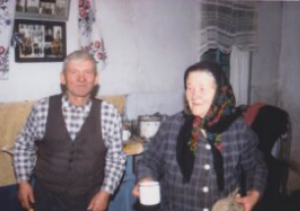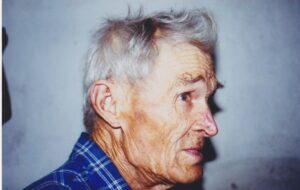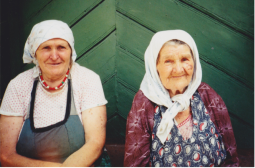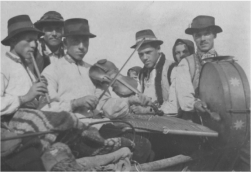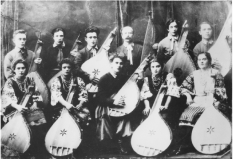—Suppose someone had to buy pants for their children, where would they get the money?
Dmytro Mykhailovych: They would sell something and raise cattle to sell. I remember my father’s kum [godfather] used to visit us and he had horses. Vedmedivka had great market fairs, almost like Sorochyntsi. You could buy anything! This was at the time when Lenin was talking about NEP, and right away everything was accessible and cheap: herring, other kinds of fish, clothes, and Singer sewing machines. We had the ones made in England on the market. Petro helped my father get some good furniture. When he was getting married, I think he had an English bed and Singer sewing machine. We only sold it recently. To have some cash, people would grow and sell the produce. People would buy a quarter of a bucket (chetvertyna) [presumably of grain] and go around singing; it was fun. This was the free market. Four or five years later Lenin died, and Stalin came to power in 1928 or 1929, and the deportations from the village to Siberia began. At the time, those deported had been the supporters of past policies, and lots of NEP supporters who had a private trade were arrested. Perhaps my father was in commerce of some kind, I don’t know. He was a farmer, same as old man Yukhym. My father also worked on the land in my grandfather’s homestead which had a large garden. I remember my father and I used to take apples to sell at the market in Cherkasy. We would leave the house at 5 a.m., yoke the cows in Hlychanky, and come back in the evening. We would come on Saturday, and early in the morning on Sunday people would buy apples. Those apples were good. Then we’d go buy something: bread, bagels, some fabric, and boots. This was at the time when I was about to start school.
………………………………………………………………………………………..
Dmytro Mykhailovych: Four or five years after Lenin died, Stalin came to power in 1928 or 1929, and the exiles to Siberia began. At the time, they were after the supporters of the past policies, and lots of NEP supporters who had their private trade were arrested. Perhaps my father was in commerce of some kind, I don’t know.
………………………………………………………………………………………..
—What were relationships like in the family before the kolhosp and how did they change after?
Dmytro Mykhailovych: Well, how did they change? We got separated, for instance. I went to Kyiv. My brother Ivan left the village. At the time, there was no right to leave and we didn’t have any passports, so my mother looked for ways to get a certificate through her connections, so we could leave the village. Ivan went to work at the factory in Cherkasy and he helped our mother out. Marika and Vasia stayed at home. I took Valia to Kyiv; she graduated from the technical college and stayed in Kyiv, sometimes visiting home. I studied in a college in Kyiv at the time and went to work when I was twenty-five. In 1937, during the Great Purge, I enrolled in the academic studio at the Franko Theater. I graduated with good results and acted in cinema. I did one episode that was banned by Stalin. When the Franko Theater was on tour in Moscow, I was a third-year student. Velychko was the People’s Artist of the Soviet Union, there was also Panasiv, and Olia, the lead broadcaster. They were my friends, and I was going to get married. The film called Flowering Ukraine was being shot, and I played a small role in it— a character who is in love with a girl. It was a very nice episode. It was shown to Stalin in Moscow and banned right away. It’s lying somewhere on the shelves, this film. I also auditioned for the main role in Boryslav Laughs. I did a good job, but an actor from Saint-Petersburg got the part. I had been shooting for a month at the Dovzhenko Studio in Kyiv, but it didn’t work out. I earned good money though; it was nice there.
………………………………………………………………………………………
— How much authority did the priest have in the village?
Dmytro Mykhalovych: The priest was strongly tied to the haidamaky (a local partisan group). The priest’s name back then was Lebedovych.
— Did he hold church services in Motronynske?
Dmytro Mykhailovych: There was also a church in Melnyky, so he held church services in Melnyky, too. I remember this Lebedovych. He baptized all my family.
— What was his name?
Dmytro Mykhailovych: I don’t remember. We were always baptized by the priests. We had three to four priests during each baptism. The godparents came, too.
— Did he have authority? Did people listen to him?
Dmytro Mykhailovych: He was a major authority. Then he moved. Our kum (Godfather) was Ivan Petrovych. I remember that as we were transporting apple carts to Cherkasy using our cows, we would stop by at his place and he lived in Chervona Sloboda at the time. The house where he lived is still there today. I don’t know who lives there now. The priest had the whole parish, and my father would always visit him on the way. The priest had a lot of authority and was clearly connected with the haidamaky. He couldn’t do without this.
………………………………………………………………………………………
—Did the priest help the people with a supportive word or good deeds?
Dmytro Mykhailovych: His authority was in the framework of the religious program: weddings, some other occasions, and births. The churches existed before the kolhosp. Starting in 1928, after New Economic Policy or toward its end, there was a transition. When the starosta and volosti were abolished, all the registrar functions were assumed by the village council. But of course the village council used the documents and notes made by the priest; he kept all of the records.
—What was the priest’s authority during the collectivization?
Dmytro Mykhailovych: He was as quiet as a rabbit. They are smart people, so he preached what he was told to. This was how it went.
—In what year was the church destroyed?
Dmytro Mykhailovych: I don’t remember, but it was destroyed by the diak himself. His son was among the partisans on the German side.
—What was his last name?
Dmytro Mykhailovych: Zinchenko, and his first name was Stepan.
—When was this, approximately?
Dmytro Mykhailovych: In the 1930s. I think, it was after the hunger. He was talking about how he was a Bolshevik, and he went up to remove the cross and tossed it away.
—When was khram held in the village?
Dmytro Mykhailovych: For Pokrova [The Intercession of the Theotokos—Trans.]. The Pokrova Church. After the church was destroyed, my mother would take me to the monastery. When the church was open, we would go there for Easter to bess the Easter bread.
—Did many people come?
Dmytro Mykhailovych: Yes. You wouldn’t be able to squeeze through the crowd. At midnight, to mark Christ’s resurrection, the choir and the priest would sing. I forgot who directed the choir. The old men must know who it was. We had a large choir; there were choir galleries upstairs. The people would stand in the church and those upstairs in the choir gallery would sing.
—Did the people sing church songs?
Dmytro Mykhailovych: Yes, they did, and they knew the songs. They were cultured. Hnat, I remember, organized a drama club. There were exhibitions. Stepan was the youngest. He knows who the choirmaster was.
………………………………………………………………………………………
—Did you celebrate religious holidays during the kolhosp times?
Dmytro Mykhailovych: Of course. But we didn’t sing koliadky because they were forbidden at the time.
—What about prior to collectivization?
Dmytro Mykhailovych: Before collectivization we used to sing koliadky big time! I used to carry a star and my kum [godparent] went with us. All of us guys would come back tipsy with bags full of treats. It was a great time. We would bring the holiday dinner to our relatives’ homes; we had many kumy—three or four pairs of kumy. You had to bring dinner to each of them, sing carols, and so on. We used to do this. In the 1930s, after Stalin came to power, all of this was despised; revolutionary [here communist] songs were introduced in the village clubs, and little by little the carols were forgotten. They stayed deep in our souls to some extent, but they were no longer public.
………………………………………………………………………………………
—Did you go to dosvitky?
Dmytro Mykhailovych: No, I was too young, and then I left for Kyiv.
—Were there no dosvitky in Kyiv?
Dmytro Mykhailovych: Everything was civilized. Olesia was the only one I dated.
—Dosvitky is socializing, isn’t it?
Dmytro Mykhailovych: Dosvitky is when a young man visits his lover, walks with her to her house, and stays with her for the night in a barn.
—Before the wedding?
Dmytro Mykhailovych: Before the wedding.
—Was this allowed?
Dmytro Mykhailovych: Yes. The parents sometimes knew. This was considered an engagement.
